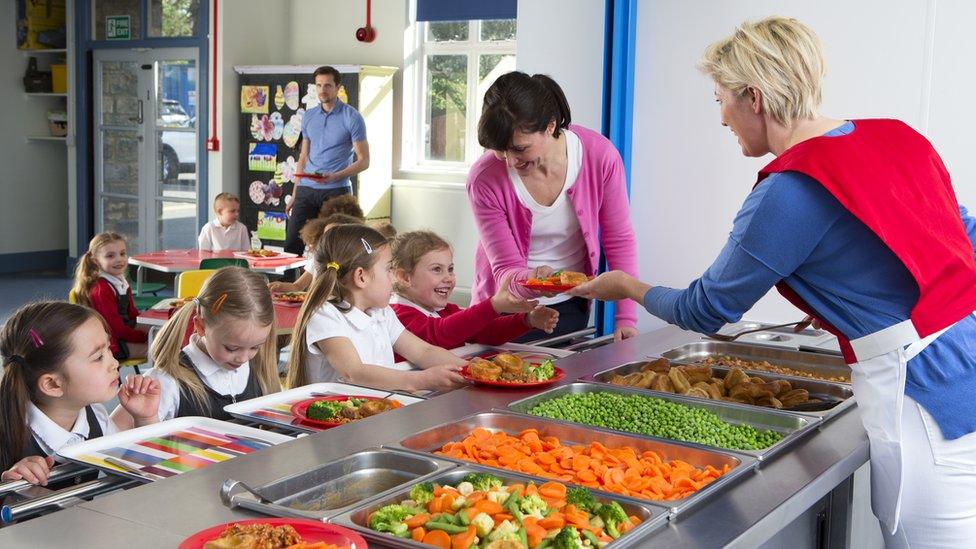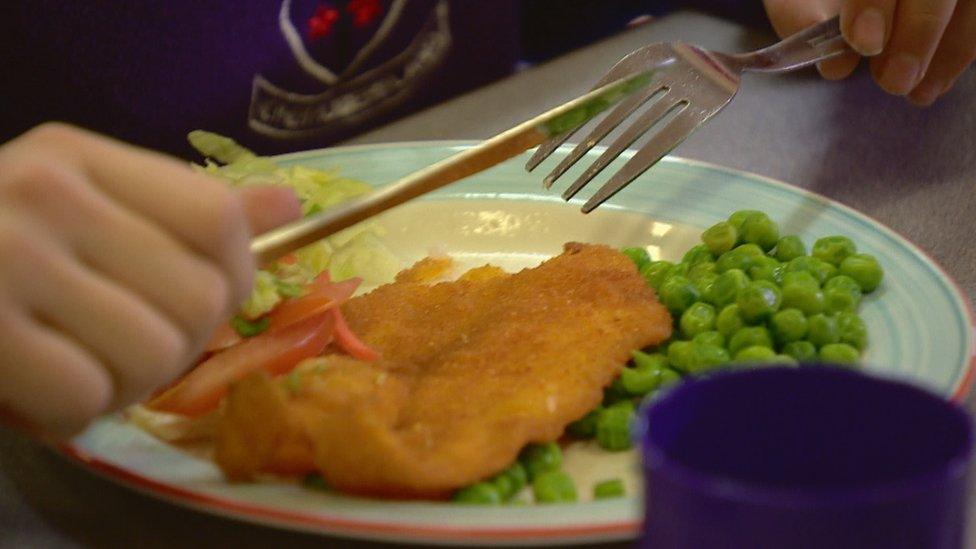Year-round meals plan to tackle 'holiday hunger' of school pupils
- Published
- comments

North Lanarkshire will offer meals 365 days a year
A Scottish council is planning to provide free meals 365 days a year to children from low income families.
North Lanarkshire Council said its proposal would help tackle "holiday hunger".
The "Food 365" programme would cover the 175 days of the year when lunches are not served in school.
If approved, the council will run a pilot project in the spring break and could then extend the scheme over the summer holidays.
Frank McNally, convener of education, said: "These proposals to tackle weekend and holiday hunger are the most ambitious in the country.
'Parents skip meals'
"Groups like the Trussell Trust are struggling to cope with demand from parents and research has suggested that pressure on food banks doubles during the holidays.
"North Lanarkshire has one of the highest concentrations of deprivation in the country and this is only going to be exacerbated by further welfare reforms."
The council cited national research which suggests that almost a third of parents with incomes under £25,000 skip meals during the school holidays so that their children can eat, and nearly two thirds are not always able to afford food outside of term time.
This rises to half and three-quarters respectively for parents with incomes under £15,000.

Teachers report that children sometimes return from holiday suffering from poor nutrition
In a survey carried out by the National Union of Teachers in England, 80% of teachers noted a rise in "holiday hunger" where children return from holidays suffering from poor nutrition.
Almost three-quarters of teachers said this was negatively affecting children's education.
While some councils in the UK have committed to holiday programmes, these do not include weekends. North Lanarkshire Council said its scheme would be the most comprehensive in the country.
Mr McNally continued: "A good diet plays a key role in healthy growth and development, supporting learning and social skills and sets a positive habit to be continued later in life.
'High levels of deprivation'
"Our plans will do much to promote healthy eating and address some of the symptoms of poverty for children who need it most."
John Dickie of the Child Poverty Action Group warmly welcomed the proposal.
But he warned it was vital to provide the meals in such a way that there was no risk of children or their families feeling stigmatised.
He said: "I haven't seen the detail of this proposal but in general terms we would welcome extension of free school meals but also stress that's it's really important that healthy free holiday lunches are offered as part of a wider package of holiday activities
"Every effort should be made to avoid the risk of stigmatising holiday provision, for example by making sure it is open to those who pay for school lunches too and isn't promoted purely as a feeding programme."
Breakfast clubs
The local SNP group welcomed the proposal but said the council should not axe school breakfast clubs.
SNP's education spokesman Councillor Tom Johnston said: "I am delighted that this council has finally agreed with our position that children shouldn't go hungry simply because the schools are closed for holidays."
He said SNP proposals to introduce the policy in 2003 had been blocked by the Labour administration.
"The SNP will support this proposal but we will amend it to go further and reverse the Labour decision to cut breakfast clubs from this summer," he added.
"Our proposal will commit this council not only to continuing breakfast clubs, but extending them from August to cover every primary school in North Lanarkshire."
Community facilities
The Scottish government said tackling poverty and inequality was a "key priority".
A spokesman added: "Our £1m a year Fair Food Fund supports projects which promote sustainable solutions to food poverty.
"In addition, local authorities also have the flexibility to provide meals to children outwith term time and some chose to use this flexibility during school holidays by providing holiday lunch clubs."
Scottish Conservative education spokeswoman Liz Smith MSP said: "Delivering free school meals for low income families for every day of the year may be a noble objective but it is undoubtedly expensive if each child is to have a nutritious meal.
"Hopefully the council has carefully considered all its options and explained to parents how it will be paying for this service."
North Lanarkshire is one of the nine "challenge authorities" in Scotland with the highest levels of deprivation. Nearly 21% of children live in low income households.
If the pilot is successful, the programme would be delivered in 23 "hubs" across the authority area, usually in community facilities.
Based on demand for other previous holiday initiatives, the cost is estimated to be £500,000.
The proposals will be discussed by councillors at a meeting of the education committee on 20 February.